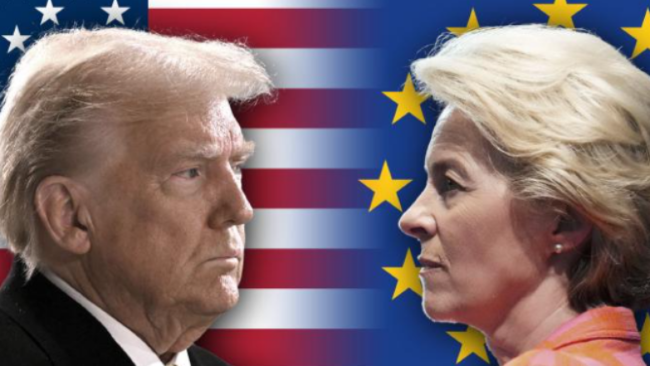Storm Brewing Over Atlantic Trade: EU Warns of Sweeping U.S. Tariffs on Pharma, Chips, and Critical Goods

“In trade, as in politics, perception is power — but policy is what shapes markets.”
A fresh wave of transatlantic trade tensions may be on the horizon, as the European Commission has raised red flags over a potential U.S. move to slap new tariffs on a broad range of European exports — including pharmaceuticals, semiconductors, trucks, and critical minerals.
Addressing the European Parliament in Strasbourg on Tuesday, European Trade Commissioner Maroš Šefčovič warned that if the current investigations by Washington progress as feared, as much as 97% of EU exports to the U.S. — valued at €549 billion ($622.8 billion) — could soon face punitive tariffs under the guise of “national security.”
The Commissioner’s message was clear: Europe is bracing for a major disruption in transatlantic commerce — one that could reshape supply chains, recalibrate investor confidence, and intensify global economic fragmentation.
From Allies to Adversaries?
While Brussels and Washington are historically strong allies, especially in multilateral trade and defense, recent years have exposed deepening fault lines. The Biden administration’s use of national security as a rationale for trade restrictions, a strategy reminiscent of the Trump era, has left European policymakers jittery.
Already, a longstanding U.S. probe into softwood lumber has been a sore point. But Šefčovič revealed that six new investigations are now underway — spanning pharma, chips, trucks, and minerals — sectors that form the backbone of Europe’s high-value exports.
For context, these sectors aren’t just about numbers on customs paperwork. They touch core industries tied to healthcare systems, electric vehicle transitions, and digital transformation agendas across both continents.
What’s Driving U.S. Protectionism?
Though the EU Trade Commissioner refrained from overt finger-pointing, analysts suggest the move aligns with growing American concerns over strategic autonomy, especially in the wake of supply chain shocks caused by the COVID-19 pandemic, the Russia-Ukraine war, and tensions with China.
Washington’s new protectionist tone reflects a broader trend among major economies aiming to reshore or friend-shore production of critical goods. For U.S. policymakers, controlling imports of semiconductors and critical minerals isn’t just about economics — it’s about safeguarding future technologies and energy security.
But Europe sees this as a slippery slope.
“The situation is not acceptable, and we cannot afford to stay idle,” Šefčovič emphasized, signaling a potential shift from diplomacy to defensive measures.
EU’s Strategic Response: Dialogue — and Deterrence
Despite the ominous warnings, Brussels isn’t abandoning hope for a negotiated settlement. Šefčovič reiterated the bloc’s readiness to pursue “a fair and balanced solution” with the U.S., while keeping litigation as a backup.
In the short term, the EU appears committed to a dual-track strategy:
- Engage Washington in constructive talks
- Simultaneously diversify trade partnerships and pursue litigation via the WTO if necessary
Šefčovič’s message to the European Parliament was both pragmatic and forward-looking. He reminded lawmakers that the U.S. accounts for 13% of global trade, but that the remaining 87% lies beyond the Atlantic — a not-so-subtle nudge towards accelerating free trade deals with Latin America, Africa, and Asia.
Pause, But No Peace: A 90-Day Window
This warning from Brussels comes just weeks after President Joe Biden extended a 90-day pause on special levies on imports, including from the EU — a move intended to de-escalate tensions and allow for talks.
In response, the EU temporarily shelved its planned countertariffs, but that truce may now be at risk.
If talks collapse or U.S. investigations yield negative findings, Europe may be forced to retaliate — potentially triggering another tariff war, one that could spill into sectors like automobiles, luxury goods, and digital services.
Implications for Businesses and Investors
For manufacturers, exporters, and supply chain managers — especially in Germany, France, Ireland, and the Netherlands — this looming tariff threat injects fresh uncertainty.
Pharmaceutical giants like Sanofi, chipmakers like ASML, and truck part suppliers across Eastern Europe may face costly new barriers to accessing the lucrative U.S. market. Likewise, U.S. tech firms and healthcare giants could see reciprocal EU regulations disrupt their operations.
Meanwhile, the message to African, Asian, and Latin American trade blocs is clear: The EU is looking outward, and fast.
“The U.S. is important, but it is not everything,” Šefčovič said. The rest of the world is now firmly on Brussels’ radar.
Bottom Line
As global trade realigns around national interest and industrial policy, Europe is preparing to defend its economic interests with both diplomatic finesse and legal firepower.
Whether this plays out as a renewed partnership or a regulatory showdown will depend on what happens next in Washington.
For businesses in Nigeria and across Africa seeking export opportunities or foreign partnerships, the signal is clear: diversification of markets and alignment with rule-based trade frameworks will be key to navigating the next wave of global commerce.












